Coronavirus: 14 more suspected cases in Australia investigated
Health authorities investigate more possible infections as the disease continues to spread, and an alert sent out to start the school year.
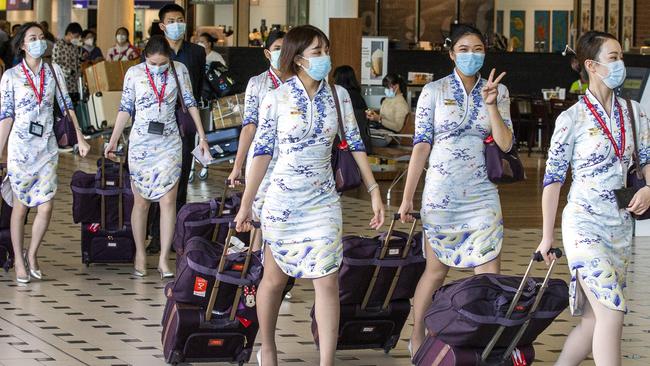
Health authorities are investigating another 14 suspected cases of coronavirus in Australia as the disease continues to spread from the outbreak epicentre in Wuhan.
There are now five confirmed cases of coronavirus diagnosed in Australia – four in NSW and one in Victoria.
A 21-year-old university student who had been living in campus accommodation has been confirmed as the fourth case of coronavirus in Sydney.
The UNSW student arrived on the last flight out of Wuhan to arrive in Sydney on Thursday.
Six of the 14 new suspected cases under investigation are in NSW, four are in WA and four are in Queensland.
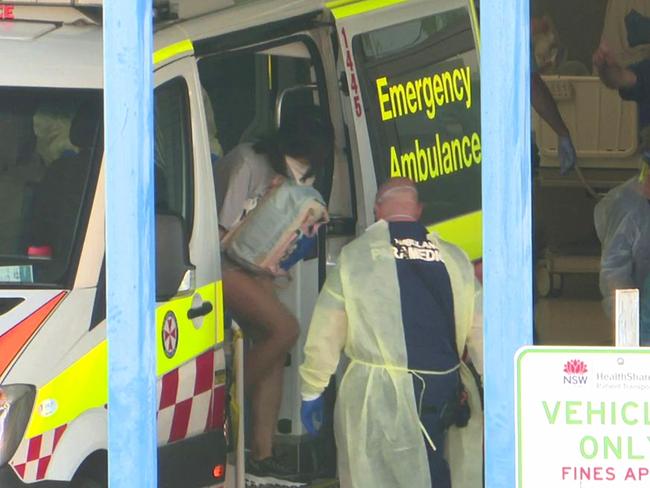
NSW chief health officer Kerry Chant said all six of the new suspected NSW cases developed in patients who had either recently been in China, or had been in contact with people infected with coronavirus.
The development comes as some schools move to warn parents to keep children who have recently returned home from Hubei province in China to keep their children home for the beginning of the school year.
But Dr Chant said the advice of authorities is that children should only be kept home if they are sick.
The Victorian Health Department issued an update this afternoon.
“As at 4pm Monday 27th January Victoria has one confirmed case of novel coronavirus, 30 negative tests and 10 pending results,” the department said.
“The advice is still to see a doctor or go to a hospital ED if you feel unwell, particularly if you have a travel history to Wuhan City, China or other locations with confirmed cases, or have been in contact with a confirmed case. Please call ahead to advise the health service of your arrival so you can be isolated as a precaution.
“A hotline was established to provide further information for those with the matching symptoms and travel history. The hotline number is 1800 675 398.“
Aussie kids stuck in China
Foreign Minister Marise Payne says diplomatic staff are scrambling to repatriate Australians, including at least 100 schoolchildren, stranded in the Chinese city of Wuhan, the epicentre of the fatal coronavirus outbreak.
The rescue bid comes as thousands of Chinese travellers are being forced to abandon plans to visit Australia after Beijing issued an unprecedented order banning all international group travel and China’s National Health Commission warned the virus was becoming more contagious.
Zhou Xianwang, the mayor of Wuhan, said at a press briefing late Sunday that he expects that experts will confirm another roughly 1,000 of the suspected infection cases currently being monitored.
As the death toll rose to 80, China said the virus was infectious even before symptoms were visible, increasing concerns about the potential rapidity of its spread.
The surprise travel ban on tourist groups sparked alarm among tourism operators, who are already battling in the wake of the brutal bushfire season.
About 1.4 million Chinese visitors come to Australia each year — a quarter of whom come with tour groups — spending almost $12bn, more than travellers from any other country.
Australia’s chief medical officer, Brendan Murphy, also conceded on Sunday that more cases of the coronavirus were inevitable.
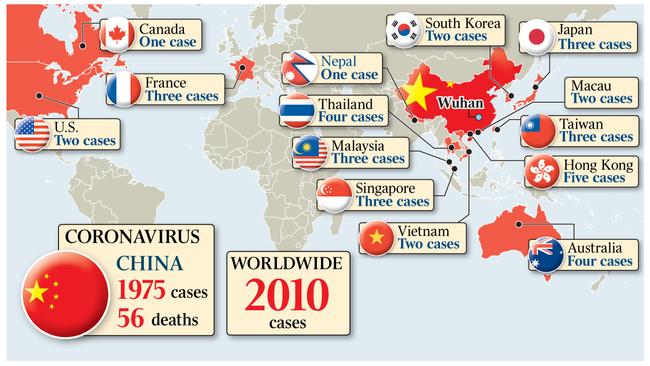
Four people in Australia — three in NSW and one in Victoria — are confirmed to be carrying the virus, with another suspected case in Sydney. It emerged on Sunday the first person infected with the virus arrived in Sydney on a plane from Wuhan more than three weeks ago.
With over 2,700 people believed to be infected with the virus, biosecurity agents are being deployed across every major airport in Australia to meet passengers arriving from China.
Ma Xiaowei, head of China’s National Health Commission, admitted: “The transmissibility shows signs of increasing and the walking source of infection has made it difficult to control and present the disease”.
Mr Xiaowei added: “We are not clear about the risk of its mutation and how it spreads. Since this is a new coronavirus there might be some changes in the coming days and weeks, and the danger it poses to people of different ages is also changing.”
According to The Lancet, early analysis of the virus’ spread shows a high contagion rate up between 1.8 to 3.4, meaning one person will infect two or three other people.
Concerns are growing for at least 100 Australian children trapped in China’s Hubei province, which was locked down last week as China’s government sought to stem the spread of the disease.
Several anxious parents told The Australian they had been desperately seeking help from the Australian government to bring home their children but had been frustrated by the response.
It is understood the children are all Australian citizens and are aged between six months and 16. Many had been in the Chinese city to celebrate the Lunar New Year, while others had been spending the summer holidays with family.
“A lot of those children have been looked after by their grandparents there,” one parent, named only as John, said. “They are desperate to get out because (there is) a shortage of face masks and other protective supplies.
“Many children are running out of baby formula powders. They eat Australian baby formula and now there is a disruption in logistics.”
Pauline Hanson told the Nine Network the children should be brought back but called for Australia’s borders to be closed to any adults who have been to Wuhan or any other part of China infected with the coronavirus.
The One Nation leader’s calls for tougher border control follow fellow crossbench senator Rex Patrick also argues for more stringent checks at Australian airports for incoming flights from coronavirus infected areas.
“Everyone who travelled to that province or in China where they do have the coronavirus, should not be allowed to travel into Australia at all. Close the borders to them,” she said.
“Get the children back, by all means. Don’t allow them in. You have to have a period of time we have to make sure it’s not infection in Australia
“We wouldn’t be able to handle it. They haven’t got a vaccine for it. They haven’t got a vaccine for it.”
Senator Patrick – from the powerful Centre Alliance senate bloc – has not gone as far as calling for borders to be closed, but said the current border control response is not good enough.
“43 flights from China today. Handing out pamphlets at airports isn’t an adequate response to the coronavirus outbreak,” he tweeted.
“Scott Morrison needs to step up Australia’s border response. For this type of situation, prevention is much better than cure.”
Health Minister Greg Hunt said on Monday that the government not yet considering banning flights from Wuhan entering Australia.
“At this stage, no, but every flight is being met by officials,” he told ABC radio.
“And officials I’m advised, will be boarding the flights and ensuring that each individual who is travelling on those flights is directly receiving information.
“We continue to follow the advice which is being updated every day from the medical officials. As I say, the Chief Medical Officer is doing that.
“The advice is that they are talking with passengers, providing information, if there are any signs of symptoms, then obviously action is being taken.
“And that during the asymptomatic phase, so when no symptoms are showing, it is not at this stage, according to World Health Organization officials, the best advice that’s available in Australia and internationally, a transmissible condition at that phase.”
Senator Payne said staff in her department were working with their Chinese counterparts to establish how many Australians were in Hubei province — and how best to get them home.
“Given the circumstances of the spread of the coronavirus, Chinese authorities are currently imposing very tight restrictions on all travel from Hubei,” she said.
“We are seeking advice from the Chinese authorities on these restrictions and whether any options are available to international travellers.”
Scientists who have studied the genetic code of the virus believe it originated with just a single animal to human transmission – possibly from a bat – and was then spread human to human.
But Andrew Rambaut, a professor of Molecular Evolution at the University of Edinburgh tweeted: “Don’t think any epidemiologist is still thinking that a non-human animal reservoir has had anything to do with the nCoV-2019 epidemic since December. Certainly the genome data doesn’t support that.’’
Tourism Minister Simon Birmingham said the government was trying to clarify how Beijing’s block on group travel would affect Australian tourism.
“We are urgently seeking clarification from Chinese officials via our embassy in Beijing on these reports and whether they include sales to Australia,” Senator Birmingham said.
Tourism Australia managing director Phillipa Harrison confirmed the ban in an email to operators in the tourism industry on Sunday. Ms Harrison said the “scope of the decision” was yet to be determined, but warned it posed a significant threat to the country’s tourism industry.
“Probably of greatest impact to the Australian tourism sector is the announcement that all group travel from China will be suspended from the 27th of January,” she said in the email.
Tourism and Transport Forum chief executive Margy Osmond said the ban was a “double whammy” for an industry already struggling with the fallout from the bushfire crisis. “Such a large part of our market is China and about a quarter of (Chinese tourists) come to Australia as part of group travel,” she said.
The ban puts at risk the roughly 280,000 Chinese visitors that travel to Australia on group bookings every year and Ms Osmond said the federal government would need to invest a “great deal” more in the tourism industry if the ban persisted.
Experts warned any sustained drop in tourism from China would also have a severe impact on Australia’s retail and leisure industries, with Chinese visitors accounting for more than one-quarter of total international tourist spending in Australia.
“We do need to watch this closely,” said the Australian Tourism Industry Council’s executive director Simon Westaway. “The bulk of their travel is concentrated around Sydney and Melbourne, and while we don’t want to get too far ahead of ourselves, we know the value of this market.”
Mr Westaway said the industry had been under a “lot of stress lately” following revelations bushfires and hazardous smoke was poised to wipe $6.4bn from the tourism sector as operators suffer their “worst summer on record”.
Mr Murphy, the nation’s chief medical officer, attempted to allay concerns on Sunday the country was facing a looming pandemic of the deadly coronavirus.
But he conceded more cases of coronavirus were inevitable after it emerged the first person infected with the virus arrived in Sydney on a plane from Wuhan more than three weeks ago. “People could have left the province before the lockdown and could (have) come to Australia through a number of flights,” he said.
The dire warning comes as the government scrambles to tighten security protocols and impose onerous health questionnaires on the thousands of travellers that arrive in Australia from China every day.
“We are now meeting every flight from China and providing the passengers with information sheets, asking them to identify themselves if they are unwell,” Mr Murphy said.
“The really important thing in Australia is that we identify and be able to isolate people with this virus.”
Some 167 flights arrive in Australia from China every week, while on Monday, nine planes will touch down in Sydney from China, six will arrive in Melbourne and three in Brisbane.
In an attempt to contain the further spread of the virus into Australia, frontline airport employees are also being offered the option of wearing surgical face masks when on duty.
The rapid spread of the disease across China and around the world has raised fears of a deadly contagion and health experts warn the disease has yet to reach its peak.
Eric Liu, a dual Australian-Chinese citizen, became stranded in Wuhan last week while visiting his parents in the disease-stricken city.
Mr Liu, who lives in Brisbane with his wife, said he wasn’t ill, but conceded there was little chance he would be able to return to Australia next week as planned.
“At the beginning I didn’t think it would affect my return to Australia, but now it seems it will definitely delay my trip back,” Mr Liu told The Australian.
“I expect I will be given some special treatment once I arrive back in Australia as I’m from the infected area.”
Additional reporting: Rachel Baxendale, Kieran Gair, Jacquelin Magnay

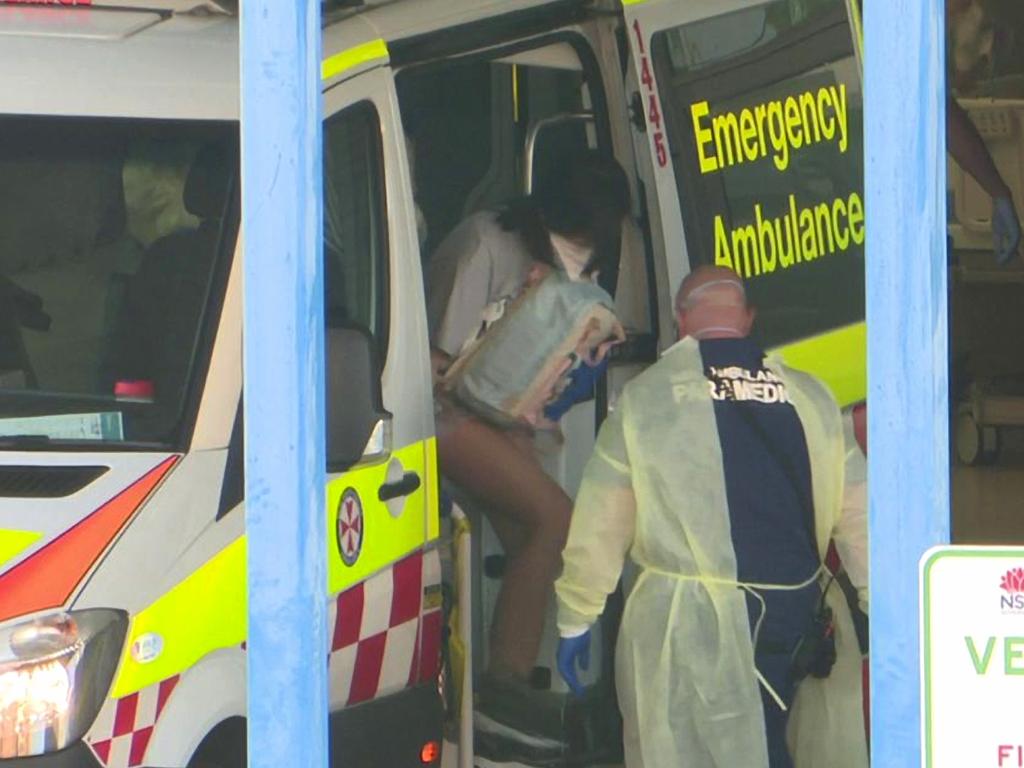
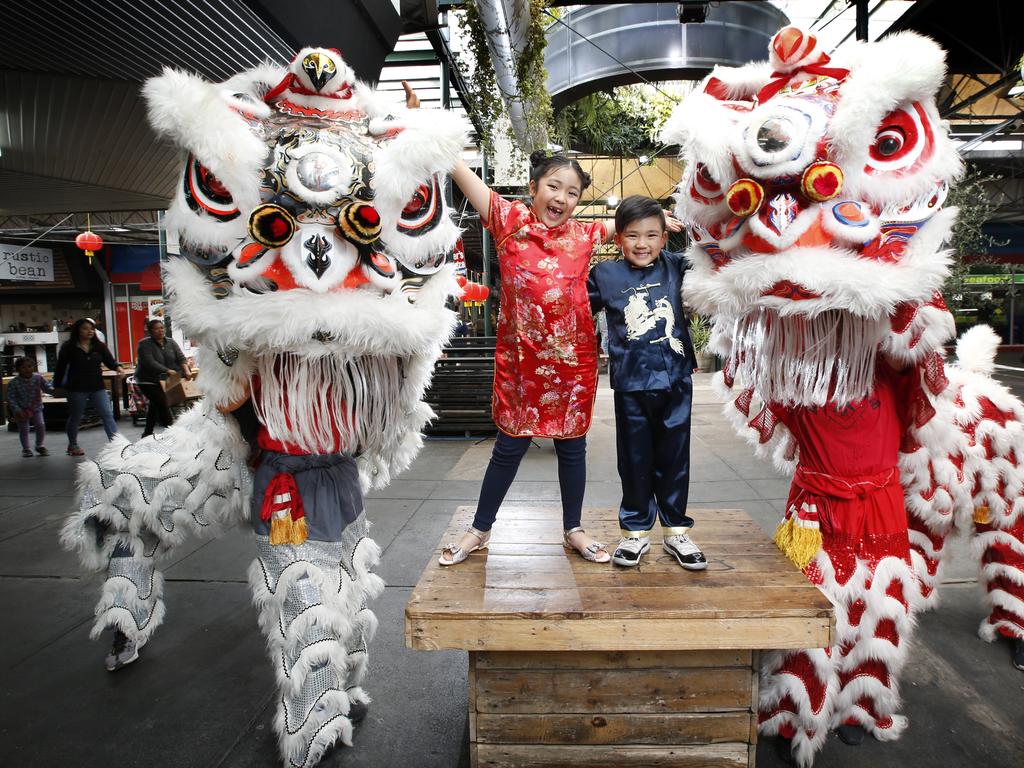

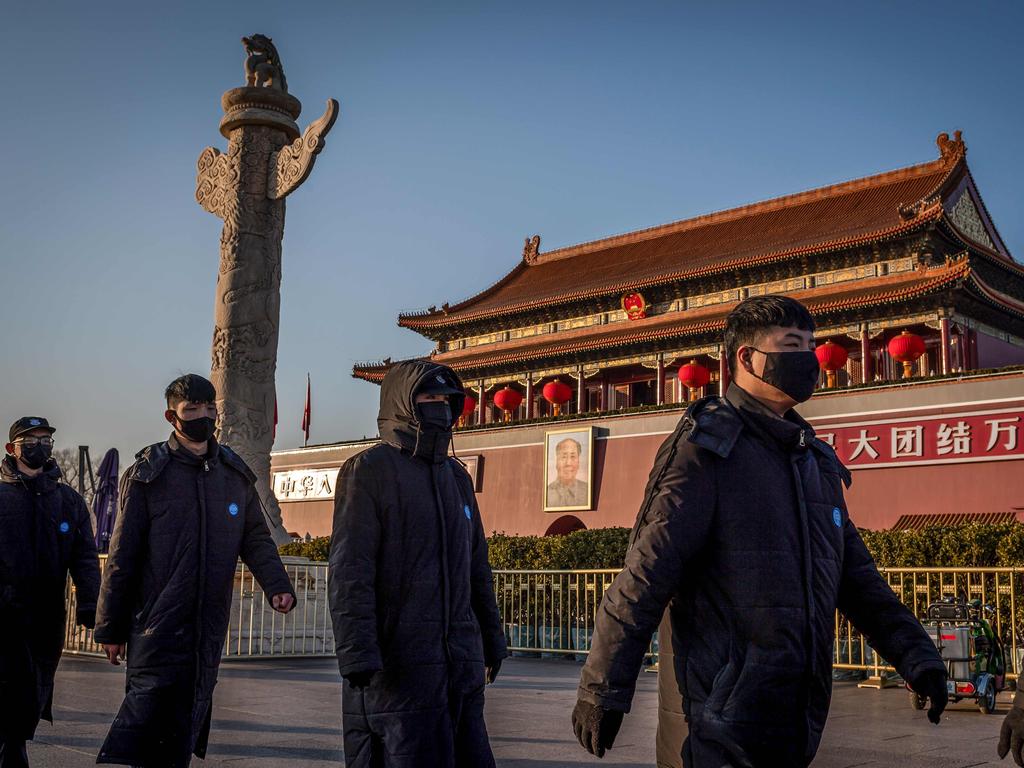


To join the conversation, please log in. Don't have an account? Register
Join the conversation, you are commenting as Logout